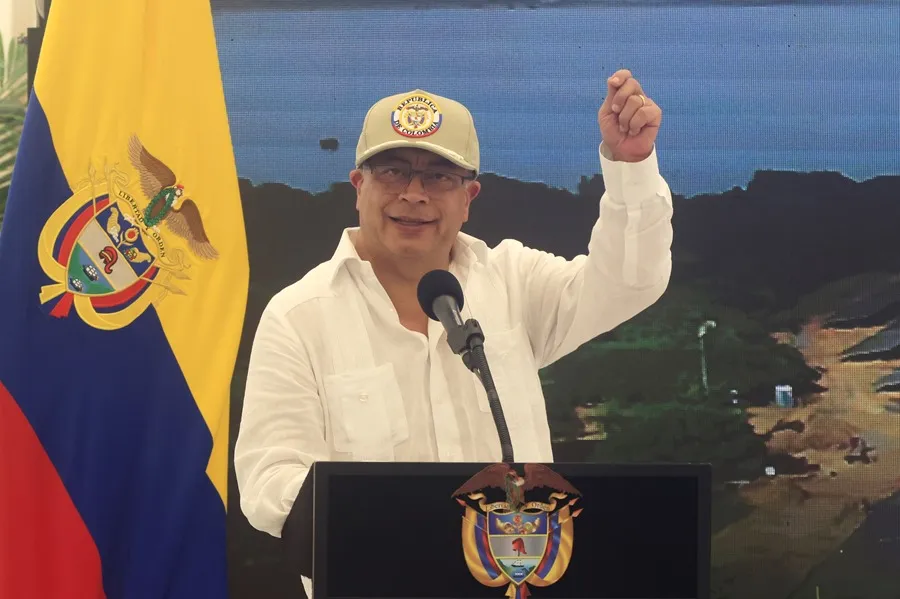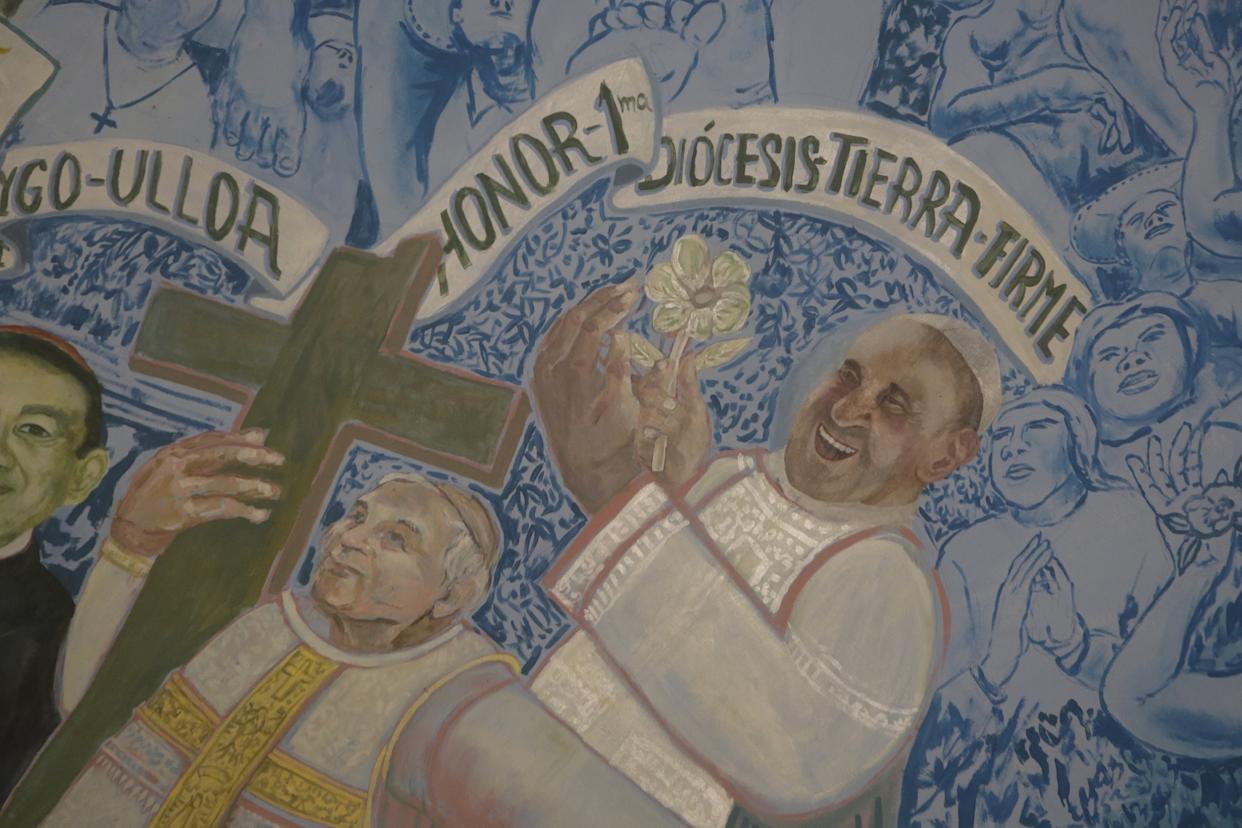International
Petro on the formulation of charges against him: “It’s the beginning of a coup d’état”

The Colombian president, Gustavo Petro, assured on Wednesday that the country initiated “a coup d’état” with the favorable presentation presented by two magistrates of the National Electoral Council (CNE) to bring charges against him for the alleged irregular financing of his campaign.
“If the Constitution says that the President of the Republic cannot be tried by an entity other than the Commission of Accusations (of the Chamber) (…) Why have two entities belonging to an administrative entity said that they raise charges against the president? That is deeply unconstitutional and is the beginning of a coup d’état in Colombia,” the president said.
CNE magistrates Álvaro Prada and Benjamín Ortiz, who are in charge of the investigation, filed the presentation that also calls for charges to be made against Ricardo Roa, president of the state oil company Ecopetrol and who was its campaign manager, according to local media on Wednesday.
In this regard, Petro, who spoke during a day of ‘Government with the popular neighborhoods’ in Cartagena de Indias, and said that “11 and a half million Colombians (who voted for him in the second round of the 2022 elections) will lose their political rights.”
“Not because no criminal judge has ruled that they are criminals, but because it was decided by the Colombian oligarchy and the corruption regime. They want to determine, as they have done in so many Latin American countries, that the president of the Republic despite being elected by the people of Colombia has to stop being president because four or five vagabonds of the political so want it,” Petro added.
Finally, he said that he will remain in office “as far as the people say.”
“If the people say later, later I will go without any fear, without any fear, we will go to where the Colombian people orders. The president of the Republic has only one commander at the front,” he said.
The National Electoral Council (CNE), which will study a paper that recommends charging the Colombian president, Gustavo Petro, for the alleged irregular financing of his campaign and violation of the electoral expenses cap, rejected the statements of the president, who considered that decision the beginning of a “coup d’état”, because they “put their magistrates at risk.”
“The serious statements against the members of this corporation break the normal functioning of the democratic system and put at risk those who are in charge of making decisions in fulfillment of their constitutional functions,” the CNE said on Wednesday in a statement.
Magistrates Álvaro Hernán Prada, former congressman of the right-wing Democratic Center party, and Benjamín Ortiz, former secretary general of the CNE, presented a presentation favorable to the positioning of charges against Petro and against Ricardo Roa, president of the state oil company Ecopetrol and who was manager of his 2022 presidential campaign, due to the alleged irregular financing of it.
The presentation presented by the two magistrates will be discussed by the full chamber of the CNE, composed of nine members, who will decide whether to admit it to continue with the process, for which they need the votes of at least five magistrates, or if, on the contrary, they file it.
This case dates back to February 2023 when the CNE opened a preliminary investigation against Petro’s presidential campaign for alleged irregularities in its financing.
As reported by that body at the time, the investigation was opened “based on the anonymous complaint filed for alleged irregularities in the financing and presentation of income and expenditure reports of the first and second presidential electoral campaign” of the Historical Pact, the left-wing coalition that led Petro to the Presidency in 2022.
International
DHS Secretary Kristi Noem’s Purse Stolen in D.C. Restaurant Heist

The purse of Kristi Noem, Secretary of the Department of Homeland Security, was stolen on Sunday night at a restaurant in Washington, D.C., Fox News Digital confirmed through several agency sources.
The handbag, taken by a white male wearing a mask, reportedly contained $3,000 in cash along with personal documents, including her passport, keys, driver’s license, and DHS badge, according to an agency spokesperson.
“Her entire family was in town, including her children and grandchildren. She was celebrating her retirement by treating them to dinner, activities, and Easter gifts,” the spokesperson added.
Crime continues to be a significant issue in the U.S. capital, particularly theft. However, violent crime reached its lowest level in 30 years last year, according to the Office of the Attorney General at the time.
International
Pope Francis: The Quiet Architect Behind the U.S.-Cuba Thaw

When then-U.S. President Barack Obama and Cuban President Raúl Castro announced the reestablishment of diplomatic relations in December 2014—after decades of hostility—there was a third figure present in both speeches: Pope Francis.
This thaw in U.S.-Cuba relations—later reversed by Donald Trump—was the result of behind-the-scenes negotiations personally encouraged by Pope Francis, who passed away on Monday at the age of 88, just over a year after becoming head of the Catholic Church.
Upon learning the news of the breakthrough, the pontiff humbly stated, “This was made possible thanks to the ambassadors and to diplomacy,” which he called “a noble, very noble job.”
In 2015, months after the announcement, Raúl Castro visited the Vatican and met with the pope. Over time, Castro developed a fondness for Francis that he never had for his predecessors, Benedict XVI and John Paul II. “If the Pope continues talking like this, sooner or later I’ll start praying again and return to the Catholic Church—and I’m not joking,” said the younger Castro, who, like his brother Fidel (1926–2016), had been educated by Jesuits—the same order to which Pope Francis belonged.
Pope Francis visited Cuba later that year. Just days before his arrival, the Cuban government announced the pardon of 3,522 common prisoners as an act of clemency.
While in Havana, the pope met with Fidel Castro, who gave him a first edition of the book Fidel and Religion by Brazilian friar and liberation theologian Frei Betto.
Criticism from the Opposition
Francis’s diplomatic approach also drew criticism from parts of the Cuban opposition. In a 2022 interview with Univision, the pope revealed he had “a human relationship” with Raúl Castro.
International
Dominican Republic Declares Three Days of Mourning for Pope Francis

Dominican Republic President Luis Abinader has declared three days of national mourning starting Tuesday following the death of Pope Francis, who passed away on Monday at the age of 88 in his residence at the Casa Santa Marta.
In an official decree, Abinader highlighted the pope’s legacy “as a global leader who promoted significant reforms within the Catholic Church and was known for his humility, openness to dialogue, and commitment to peace among nations.”
During the mourning period, the national flag will be flown at half-staff at military facilities and public buildings.
According to a statement from the Office of the Presidency, although Pope Francis never visited the Dominican Republic during his papacy, he maintained a close relationship with the country. He expressed solidarity and empathy during difficult times, including offering prayers for the victims of the recent tragedy at a Santo Domingo nightclub on April 8, which claimed 232 lives and left more than 180 injured.
-

 Central America4 days ago
Central America4 days agoNicaraguan Exiles to Mark 7th Anniversary of 2018 Protests with Global Commemorations
-

 International4 days ago
International4 days agoDominican ‘False Hero’ Arrested for Faking Role in Nightclub Collapse That Killed 231
-

 International3 days ago
International3 days agoACLU seeks emergency court order to stop venezuelan deportations under Wartime Law
-

 Central America3 days ago
Central America3 days agoUN complaint filed against Costa Rica over detention of migrant children
-

 International2 days ago
International2 days agoThousands rally nationwide against Trump’s threat to U.S. democracy
-

 Central America1 day ago
Central America1 day agoSenator Van Hollen Meets with Deported MS-13 Member in El Salvador; Trump and Bukele React
-

 International1 day ago
International1 day agoPope Francis Appears for Easter Blessing, Calls for Peace and Religious Freedom
-

 Central America3 hours ago
Central America3 hours agoCardinal Rodríguez to Attend Funeral of Pope Francis: “He Was Very Dear to Me”
-

 International3 hours ago
International3 hours agoDominican Republic Declares Three Days of Mourning for Pope Francis
-

 Central America3 hours ago
Central America3 hours agoNicaragua’s Ortega and Murillo Mourn Pope Francis, Acknowledge ‘Difficult’ Relationship
-

 International2 hours ago
International2 hours agoDHS Secretary Kristi Noem’s Purse Stolen in D.C. Restaurant Heist
-

 International2 hours ago
International2 hours agoPope Francis: The Quiet Architect Behind the U.S.-Cuba Thaw















